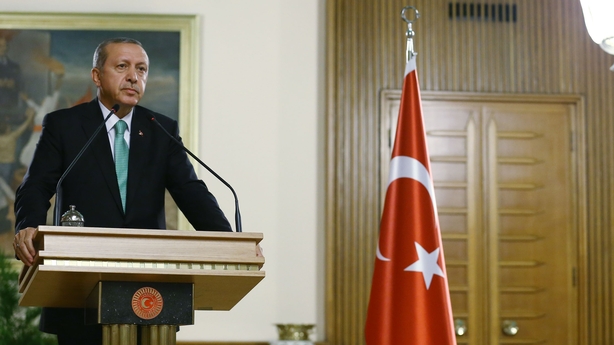Turkish authorities have detained a nephew of Fethullah Gulen, the US-based Muslim cleric accused by Ankara of orchestrating last weekend's failed military coup, the state news agency Anadolu reported today.
Mr Gulen, who has lived in self-imposed exile in the United States since 1999, but has an extensive network of schools, charities and followers in Turkey, denies any involvement in the 15 July coup attempt, in which at least 246 people were killed.
His nephew, Muhammed Sait Gulen, was detained in the north-eastern Turkish city of Erzurum and will be brought to the capital Ankara for questioning, Anadolu reported.
It is the first time a relative of Gulen has been reported detained since the failed coup.
Turkish President Tayyip Erdogan accuses Gulen of building a "state within a state" and of plotting to overthrow Turkey's government, charges the 75-year-old cleric has denied.
Among possible charges that could be brought against him is membership of a terrorist organisation, the agency said.
Separately, Mr Erdogan has ordered the closure of thousands of private schools, charities and other institutions in his first decree since imposing a state of emergency.
A restructuring of Turkey's military also drew closer, with a planned meeting between Mr Erdogan and the already purged top brass brought forward.
In the decree, published by Anadolu, Mr Erdogan extended to a maximum of 30 days from four days the period in which some suspects can be detained.
It said this was to facilitate a full investigation into the coup attempt.
Mr Erdogan said in an interview this week that he would restructure the armed forces and bring in "fresh blood".
Turkey's Supreme Military Council (YAS) will meet under Mr Erdogan's supervision on 28 July, a few days earlier than originally planned, private broadcaster NTV reported.
The YAS meeting, which usually takes place every August, will be held this time in the presidential palace, not as is customary at the headquarters of the military General Staff.
The Turkish president declared the state of emergency on Wednesday, saying it would enable authorities to swiftly and effectively root out supporters of the coup.

The state of emergency allows the president and government to pass laws without first having to win parliamentary support and also allows them to curb or suspend rights and freedoms as they deem necessary.
Turkish authorities have already launched a series of mass purges of the armed forces, police, judiciary and education system, targeting followers of Mr Gulen, who operates an extensive network of schools and charitable foundations.
The first decree signed by Mr Erdogan authorises the closure of 1,043 private schools, 1,229 charities and foundations, 19 trade unions, 15 universities and 35 medical institutions over suspected links to the Gulen movement, the Anadolu agency said.
Parliament must still approve the decree but requires only a simple majority, which the ruling AK Party founded by Mr Erdogan and in power in Turkey since 2002 commands.
In an address to politicians last night, Mr Erdogan urged Turks to continue attending rallies in major cities in support of democracy and against the coup plotters.

Turkey expects to complete within a week to ten days a dossier requesting Mr Gulen's extradition from the United States, Foreign Minister Mevlut Cavusoglu told private broadcaster NTV in an interview.
Mr Cavusoglu said the link between soldiers involved in the abortive coup and Mr Gulen's extensive network of followers was "very clear", adding that Turkey would do all it could "politically and legally" to secure his extradition.
Washington has said Ankara needs to provide clear evidence of Mr Gulen's involvement before it can agree to extradite him.
Lawyers say the process could take many years.
Turkish authorities have suspended, detained or placed under investigation more than 60,000 soldiers, police, judges, teachers, civil servants and others in the past week.

